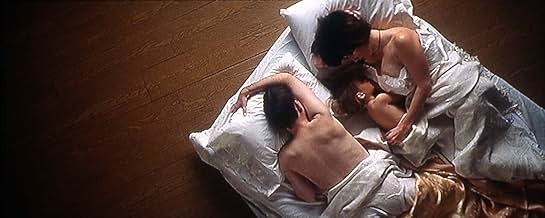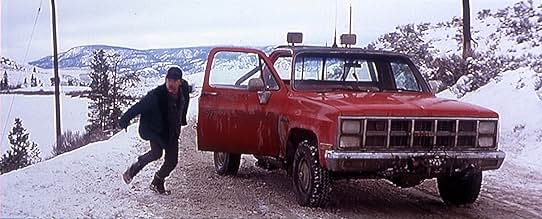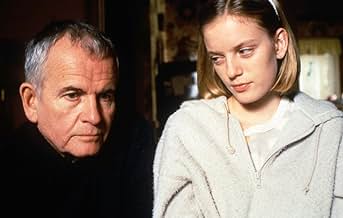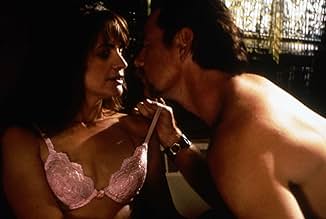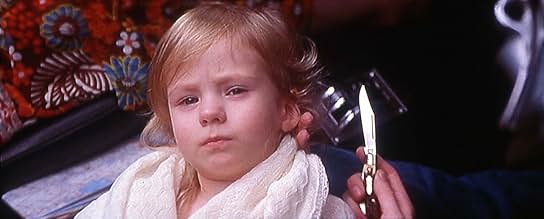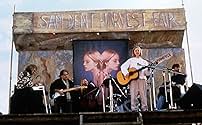CALIFICACIÓN DE IMDb
7.4/10
38 k
TU CALIFICACIÓN
Un accidente de autobús en un pequeño pueblo lleva a un abogado al lugar para defender a las familias, pero descubre que no todo es lo que parece.Un accidente de autobús en un pequeño pueblo lleva a un abogado al lugar para defender a las familias, pero descubre que no todo es lo que parece.Un accidente de autobús en un pequeño pueblo lleva a un abogado al lugar para defender a las familias, pero descubre que no todo es lo que parece.
- Dirección
- Guionistas
- Elenco
- Nominado a 2 premios Óscar
- 34 premios ganados y 56 nominaciones en total
- Dirección
- Guionistas
- Todo el elenco y el equipo
- Producción, taquilla y más en IMDbPro
Opiniones destacadas
Lately I've been seeing just about every movie that someone recommends to me, and "the Sweet Hereafter" has been on quite a few of my friends' lists. I was excited about finally seeing the movie.
What I found was less compelling than I expected. None of the characters were really engaging, and perhaps that's the aim of the film. But I honestly can't understand how this movie could have made people cry. Who did they identify with? Ian Holm's character, whose grimacing and silence set my teeth on edge, and whose attitude toward the families of the accident victims was so entirely self-serving? Sarah Polley's character, who almost never displayed any spark of life? And even if I had begun to identify with one character or another, I would have been instantly put off by the trite lines that kept coming out of their mouths. "Let me direct your rage?" Give me a break.
Not to imply too much of a connection between the films, but if you want to feel the terror and rage surrounding a tragedy as though you were there living through it, see "Boys Don't Cry." The words that go unsaid in that film are worth much more than those voiced-over or spoken all too clearly in "the Sweet Hereafter."
What I found was less compelling than I expected. None of the characters were really engaging, and perhaps that's the aim of the film. But I honestly can't understand how this movie could have made people cry. Who did they identify with? Ian Holm's character, whose grimacing and silence set my teeth on edge, and whose attitude toward the families of the accident victims was so entirely self-serving? Sarah Polley's character, who almost never displayed any spark of life? And even if I had begun to identify with one character or another, I would have been instantly put off by the trite lines that kept coming out of their mouths. "Let me direct your rage?" Give me a break.
Not to imply too much of a connection between the films, but if you want to feel the terror and rage surrounding a tragedy as though you were there living through it, see "Boys Don't Cry." The words that go unsaid in that film are worth much more than those voiced-over or spoken all too clearly in "the Sweet Hereafter."
I've seen this film twice now, and had the same reaction both times, so it's not out of gut reaction that I label "The Sweet Hereafer" an odious piece of simple-minded garbage.
The central idea (a school bus crash) has such intrinsic emotional repercussions that I can see how most viewers are washed away in grief enough to not notice the emptiness of the conceit built around it.
As an intruding lawyer, Ian Holm is asked to give a performance of staggeringly self-conscious falseness in which his every word, movement and breath is meant to project "SOMETHING IMPORTANT". His episodic encounters with the people of the community in which the accident took place only reveals Egoyan's total condescension toward life's "little people", presenting them as simpletons who, gosh darn it, love their children and each other and turn their noses up at anything so disgusting as a dollar bill.
In a failed attempt to make at least one character two-dimensional, a subplot is slopped on about the lawyer losing touch with his own child, the most ridiculous drug-addicted banshee every put on film.
Toss in heavy-handed allegories, heart-tugging muzak and trite conclusions, and what have you got? An award-winning "masterpiece", to hear most people talk. More likely they woke up the next morning, remembered something about angelic children heading for their final bus ride, and forgot the manipulative banality of the rest.
View the first episode of Krzysztof Kieslowski's 1988 "Decalogue", which covers similar thematic ground and, in 50 short minutes, accomplishes worlds more.
3 out of 10 for nice work by actors Bruce Greenwood and Sarah Polley.
The central idea (a school bus crash) has such intrinsic emotional repercussions that I can see how most viewers are washed away in grief enough to not notice the emptiness of the conceit built around it.
As an intruding lawyer, Ian Holm is asked to give a performance of staggeringly self-conscious falseness in which his every word, movement and breath is meant to project "SOMETHING IMPORTANT". His episodic encounters with the people of the community in which the accident took place only reveals Egoyan's total condescension toward life's "little people", presenting them as simpletons who, gosh darn it, love their children and each other and turn their noses up at anything so disgusting as a dollar bill.
In a failed attempt to make at least one character two-dimensional, a subplot is slopped on about the lawyer losing touch with his own child, the most ridiculous drug-addicted banshee every put on film.
Toss in heavy-handed allegories, heart-tugging muzak and trite conclusions, and what have you got? An award-winning "masterpiece", to hear most people talk. More likely they woke up the next morning, remembered something about angelic children heading for their final bus ride, and forgot the manipulative banality of the rest.
View the first episode of Krzysztof Kieslowski's 1988 "Decalogue", which covers similar thematic ground and, in 50 short minutes, accomplishes worlds more.
3 out of 10 for nice work by actors Bruce Greenwood and Sarah Polley.
I re-watched The Sweet Hereafter on video last night, and am still haunted by it today. It is structured so that you know some of the basic tragic plot near the beginning. This caused my eyes to water at some of the beautiful lyrical overhead tracking shots of the school bus winding through the snow covered roads of the Pacific northwest.
The film switches between the time that the lawyer arrives in town to "help" the families receive compensation, and to days just prior to the accident. We witness a loving "hippie" couple who has adopted a beautiful Native American boy, a loving mother of a school phobic learning disabled boy, and a widower who loves his two children a great deal and sees them off to school by following them in his truck. This same widower is having an affair with the mother of the school phobic--she is unhappily married to a "pig" of a husband. Complicating matters is the father who obviously loves his teenage daughter in Lolita-like fashion.
Part of the theme of The Sweet Hereafter is similar to Magnolia--accidents do happen--perhaps no one at fault... or perhaps all the adults had some part in it without anyone being at fault, as only the innocent children were killed.
The town had changed... tragedy has taken away the town's joy and innocence. The parents are no longer open with each other, but guarded, suspicious... in deep grief.
The lawyer is little more than an ambulance chaser, attempting to profit off their tragedy. Yet, he, too is a tragic figure who has already "lost" his daughter--
He had saved her when she was a baby, yet she has now turned away from him... and his feelings are now ambivalent towards her--he is a grief-stricken, defeated father, who vascillates between wanting to talk with his daughter on his cell phone and deciding to cut her off.
The story of the Pied Piper is interweaved between various events in the movie to give greater depth to the story. There's also a great scene in the movie between the lawyer and the garage mechanic, who has lost his two children, that shows that the theme is much broader than the literal story:
"I'm telling you this because... we've all lost our children, Mr. Ansel. They're dead to us. They kill each other in the streets. They wander comatose in shopping malls. They're paralyzed in front of televisions. Something terrible has happened that's taken our children away. It's too late. They're gone."
This movie isn't for everyone. It's a serious, layered piece with a lot of melancholy. The kind of fare that film critics can love, but Academy voters will avoid. But what it strives to accomplish is done very well. And it will stay with you long after the final scenes have appeared.
The film switches between the time that the lawyer arrives in town to "help" the families receive compensation, and to days just prior to the accident. We witness a loving "hippie" couple who has adopted a beautiful Native American boy, a loving mother of a school phobic learning disabled boy, and a widower who loves his two children a great deal and sees them off to school by following them in his truck. This same widower is having an affair with the mother of the school phobic--she is unhappily married to a "pig" of a husband. Complicating matters is the father who obviously loves his teenage daughter in Lolita-like fashion.
Part of the theme of The Sweet Hereafter is similar to Magnolia--accidents do happen--perhaps no one at fault... or perhaps all the adults had some part in it without anyone being at fault, as only the innocent children were killed.
The town had changed... tragedy has taken away the town's joy and innocence. The parents are no longer open with each other, but guarded, suspicious... in deep grief.
The lawyer is little more than an ambulance chaser, attempting to profit off their tragedy. Yet, he, too is a tragic figure who has already "lost" his daughter--
He had saved her when she was a baby, yet she has now turned away from him... and his feelings are now ambivalent towards her--he is a grief-stricken, defeated father, who vascillates between wanting to talk with his daughter on his cell phone and deciding to cut her off.
The story of the Pied Piper is interweaved between various events in the movie to give greater depth to the story. There's also a great scene in the movie between the lawyer and the garage mechanic, who has lost his two children, that shows that the theme is much broader than the literal story:
"I'm telling you this because... we've all lost our children, Mr. Ansel. They're dead to us. They kill each other in the streets. They wander comatose in shopping malls. They're paralyzed in front of televisions. Something terrible has happened that's taken our children away. It's too late. They're gone."
This movie isn't for everyone. It's a serious, layered piece with a lot of melancholy. The kind of fare that film critics can love, but Academy voters will avoid. But what it strives to accomplish is done very well. And it will stay with you long after the final scenes have appeared.
The Sweet Hereafter is as tragic, sad and matter-of-fact as movies get, but it's still so very beautiful that it becomes a film that's virtually impossible to forget.
The story makes no secret of the fact what terrible tragedy will happen, right from the outset. A lesser filmmaker than Atom Egoyan would've jumped at the chance to shock the audience with the freak accident that robs the town of Sam Dent of nearly all their children, by telling the story in a linear fashion. Not Egoyan. The story is fragmented, thus enhancing the true point: This is not about the overwhelming power of loss, it is about the overwhelming power of survivor's guilt (nicely represented in Browning's poem The Pied Piper Of Hamelin, which is referred to in the movie). It's all about people who grieve not only for the ones they've lost, but also for themselves, how empty their lives have become because of their tragedies. In focussing on that point, the film refrains from manipulative sentiment (which so many others don't), and presents true and unintrusive emotion, that, in the end, despite all the terror, shines a light of hope, for the sweet hereafter is not only the peaceful afterlife, it's also the peaceful future, the continuation of life...
The performances speak for themselves. Ian Holm and Sarah Polley shine in particular, through nicely subdued and subtle acting. Polley also excels as a fantastic singer-songwriter. The songs in the movie were written and performed all by herself.
Egoyan's direction is simply masterful in its beauty, elegance and evocation.
One of the best films of the 1990s.
10 out of 10.
The story makes no secret of the fact what terrible tragedy will happen, right from the outset. A lesser filmmaker than Atom Egoyan would've jumped at the chance to shock the audience with the freak accident that robs the town of Sam Dent of nearly all their children, by telling the story in a linear fashion. Not Egoyan. The story is fragmented, thus enhancing the true point: This is not about the overwhelming power of loss, it is about the overwhelming power of survivor's guilt (nicely represented in Browning's poem The Pied Piper Of Hamelin, which is referred to in the movie). It's all about people who grieve not only for the ones they've lost, but also for themselves, how empty their lives have become because of their tragedies. In focussing on that point, the film refrains from manipulative sentiment (which so many others don't), and presents true and unintrusive emotion, that, in the end, despite all the terror, shines a light of hope, for the sweet hereafter is not only the peaceful afterlife, it's also the peaceful future, the continuation of life...
The performances speak for themselves. Ian Holm and Sarah Polley shine in particular, through nicely subdued and subtle acting. Polley also excels as a fantastic singer-songwriter. The songs in the movie were written and performed all by herself.
Egoyan's direction is simply masterful in its beauty, elegance and evocation.
One of the best films of the 1990s.
10 out of 10.
Atom Egoyan's, The Sweet Hereafter is a film about loss and recovery. An accident involving a school bus in snowy Canadian roads has left a small town devastated which left many children dead.
The grieving parents are visited by a no win no fee lawyer, Mitchell Stevens (Ian Holm.) He is a partner in a law firm and he might be just doing his job but it seems to be without much vigour or conviction. I am not sure whether money is even a motivation for him. Stevens own daughter is a drug addict who only contacts him when she wants money for more drugs. Apart from that she hates him and he knows he has lost her.
He persuades some of the parents to file a class action lawsuit by claiming the design or construction of the bus was faulty.
The grieving parents and some of the survivors all have some secret. Did bus driver Dolores Driscoll (Gabrielle Rose) drive too fast or drive carelessly given the road conditions? Does Nicole Burnell (Sarah Polly) one of the kids paralysed below the waist might want to take revenge on her abusive father?
One of the parent, Billy (Bruce Greenwood) who was following the bus and waving at his children is against the lawsuit and wants the others to drop it.
The film does not start with the crash. It is told in non chronological order and we have several story strands. one of them is the use of 'The Pied Piper of Hamelin' which draws parallels of a town suffering from the loss of its children. Maybe Stevens will lead the townsfolk out of the darkness but he is suffering as well when he recounts his struggle with his drug addict daughter to one of her old friends he meets in a plane journey.
The film is about grief, sadness and the tortuous journey to recovery. Unfortunately the film does not always flow well and although I understand why some people would want to sue for damages, I never really understood why Billy did not want to sue? Nicole is paralysed, money would be useful to her and help her.
The grieving parents are visited by a no win no fee lawyer, Mitchell Stevens (Ian Holm.) He is a partner in a law firm and he might be just doing his job but it seems to be without much vigour or conviction. I am not sure whether money is even a motivation for him. Stevens own daughter is a drug addict who only contacts him when she wants money for more drugs. Apart from that she hates him and he knows he has lost her.
He persuades some of the parents to file a class action lawsuit by claiming the design or construction of the bus was faulty.
The grieving parents and some of the survivors all have some secret. Did bus driver Dolores Driscoll (Gabrielle Rose) drive too fast or drive carelessly given the road conditions? Does Nicole Burnell (Sarah Polly) one of the kids paralysed below the waist might want to take revenge on her abusive father?
One of the parent, Billy (Bruce Greenwood) who was following the bus and waving at his children is against the lawsuit and wants the others to drop it.
The film does not start with the crash. It is told in non chronological order and we have several story strands. one of them is the use of 'The Pied Piper of Hamelin' which draws parallels of a town suffering from the loss of its children. Maybe Stevens will lead the townsfolk out of the darkness but he is suffering as well when he recounts his struggle with his drug addict daughter to one of her old friends he meets in a plane journey.
The film is about grief, sadness and the tortuous journey to recovery. Unfortunately the film does not always flow well and although I understand why some people would want to sue for damages, I never really understood why Billy did not want to sue? Nicole is paralysed, money would be useful to her and help her.
¿Sabías que…?
- TriviaAs indicated on writer and director Atom Egoyan's commentary track on the DVD, many people ask about the odd mask worn by the notetaker during the deposition scene. This is a stenographer's mask, an item which is used in real life by a stenographer to record his or her own voice during the deposition.
- ErroresWhen Stephens visits the Ottos, and Mr. Otto offers him some tea, we hear a tea kettle whistling but the one we see on the wood stove is not the whistling type, and there is no steam coming from the kettle.
- Citas
Mitchell Stephens: You'd make a good poker player, kid.
- Bandas sonorasOne More Colour
Words and Music by Jane Siberry
Courtesy of Wing in Music/Red Sky Music
Arranged by Mychael Danna
Vocal by Sarah Polley
Performed by The Sam Dent Band
Selecciones populares
Inicia sesión para calificar y agrega a la lista de videos para obtener recomendaciones personalizadas
- How long is The Sweet Hereafter?Con tecnología de Alexa
Detalles
Taquilla
- Presupuesto
- CAD 5,000,000 (estimado)
- Total en EE. UU. y Canadá
- USD 3,263,585
- Fin de semana de estreno en EE. UU. y Canadá
- USD 31,149
- 12 oct 1997
- Total a nivel mundial
- USD 3,263,585
- Tiempo de ejecución1 hora 52 minutos
- Color
- Mezcla de sonido
- Relación de aspecto
- 2.35 : 1
Contribuir a esta página
Sugiere una edición o agrega el contenido que falta

Principales brechas de datos
What is the Japanese language plot outline for Dulce porvenir (1997)?
Responda

